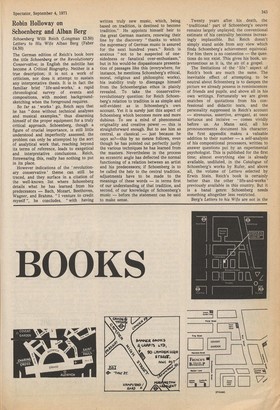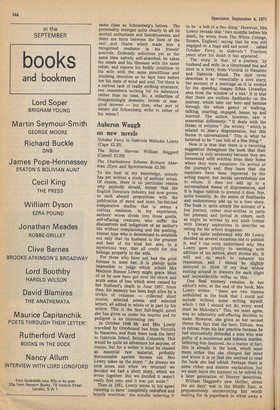Robin Holloway on Schoenberg and Alban Berg
Schoenberg Willi Reich (Longman £3.50) Letters to His Wife Alban Berg (Faber £4.50) The German edition of Reich's book bore the title Schoenberg or the Revolutionary Conservative; in English the subtitle has become A Critical Biography. Neither is a true description; it is not a work of criticism, nor does it attempt to sustain any interpretative thesis. It is in fact the familiar brief 'life-and-works,' a rapid chronological survey of events and compositions, with modest backgroundsketching when the foreground requires.
So far as ' works ' go, Reich says that he has "done without technical analyses and musical examples," thus disarming himself of the proper equipment for a truly critical approach. Schoenberg, though a figure of crucial importance, is still little understood and imperfectly assessed; the problem can only be attempted by the sort of analytical work that, reaching beyond its terms of reference, leads to exegetical and interpretative conclusions. Reich, forswearing this, really has nothing to put in its place.
However indications of the 'revolutionary conservative' theme can still be traced, and they surface in a citation of the well-known list where Schoenberg details what he has learned from his predecessors — Bach, Mozart, Beethoven, Wagner, and Brahms. "I venture to credit myself ", he concludes, "with having written truly new music, which, being based on tradition, is destined to become tradition." He appoints himself heir to the great German masters, renewing their line by the discovery "thanks to which the supremacy of German music is assured for the next hundred years." Reich is anxious "not to be suspected of onesidedness or fanatical over-enthusiasm," but in his would-be dispassionate presentation of passages like this (everywhere, for instance, he mentions Schoenberg's ethical, moral, religious and philosophic works), his inability truly to disengage himself from the Schoenbergian ethos is plainly revealed. To take the conservativerevolutionary question: for Reich Schoenberg's relation to tradition is as simple and self-evident as in Schoenberg's own account. Yet it is surely just this aspect of Schoenberg which becomes more and more dubious. To see a mind of phenomenal originality and creative power — this is straightforward enough. But to see him as central, as classical — just because he says so?—this by no means follows, even though he has pointed out perfectly justly the various techniques he has learned from the masters. Nevertheless in the process an eccentric angle has deflected the normal functioning of a relation between an artist and his predecessors; if Schoenberg is to be called the heir to the central tradition, adjustments have to be made to the meanings of these words — in terms first of our understanding of that tradition, and second, of our knowledge of Schoenberg's music — before the statement can be said to make sense. Twenty years after his death, the ' traditional' part of Schoenberg's oeuvre remains largely unplayed; the conventional estimate of his centrality becomes increasingly implausible. But Reich doesn't simply stand aside from any view which finds Schoenberg's achievement equivocal. For him there is no contention — the questions do not exist. This gives his book, unpretentious as it is, the air of a gospel.
The limitations of the 'life' aspect of Reich's book are much the same. The inevitable effect of attempting to be neutral about Schoenberg is to dampen the picture we already possess in reminiscences of friends and pupils, and above all in his own writings. Fortunately we are given snatches of quotations from his confessional and didactic texts, and the personality suppressed in Reich's account — strenuous, assertive, arrogant, at once tortuous and incisive — comes vividly before us. As Mann said, all his pronouncements document his character; the first appendix makes a valuable addition to their number — a self-analysis of his compositional processors, written to answer questions put by an experimental psychologist. This is published for the first time; almost everything else is already available, undiluted, in the Catalogue of Schoenberg's works by Rufer, and above all, the volume of Letters selected by Erwin Stein. Reich's book is certainly better than the other ' life-and-works ' previously available in this country. But it is a banal genre: Schoenberg needs something altogether less restricted.
Berg's Letters to his Wife are not in the same class as Schoenberg's letters. The personality emerges quite clearly in all its morbid enthusiasm and fastidiousness, and there are hints between the lines of the tact ,and charm which made him a recognized mediator in his friends' quarrels. Endlessly solicitous yet at the same time naively self-absorbed, he takes his meals and his illnesses with the same relish, and reports his bodily condition to his wife with the same punctilious and touching devotion as he lays bare before her his state of mind and soul. Yet there is a curious lack of really striking utterance; one remembers nothing for its substance rather than its tone. So, a collection of disappointingly domestic letters of marginal interest — but then, what sort of letters did Schoenberg write to either of his wives ?



































 Previous page
Previous page